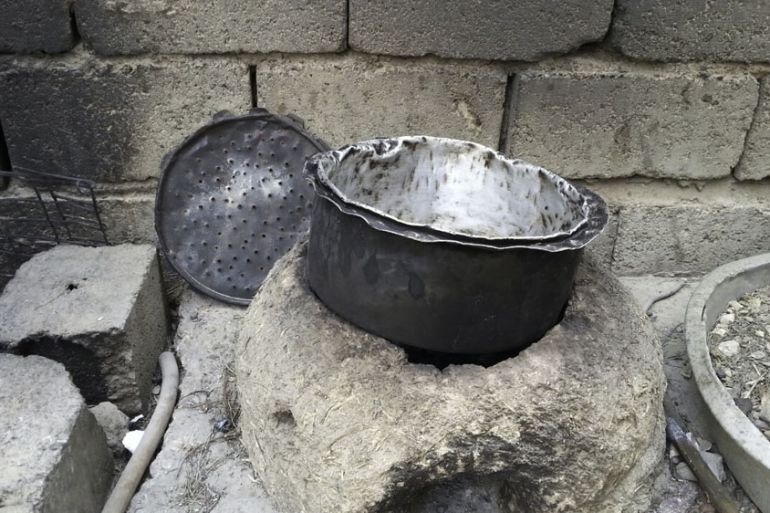Fallujah crisis: ‘We are being left to slow death’
Controlled by ISIL and besieged by government forces, residents struggle to survive amid shortage of food supplies.

Thousands of Iraqi civilians in Fallujah city are “dying of hunger”, according to residents and local officials.
The city’s population, estimated between 80.000 to 100.000 people, is suffering from a shortage of food, medicine and fuel.
Keep reading
list of 4 itemsMoscow theatre attack suspects show signs of beating in court
Four men showing signs of severe beating charged over Moscow concert attack
Russia mourns Moscow concert hall attack victims as death toll rises to 137
“We are feeding our newborn babies animal [cow] milk,” said Um Hussein, 59, a resident of Fallujah.” We are under siege. No food and no medicine is being brought into Fallujah. We have been suffering for a long time now, and no one is showing any mercy towards the families,” she told Al Jazeera.
The city, located in Anbar province, 50km west of Baghdad, has been under the control of the Islamic State of Iraq and the Levant (ISIL, also known as ISIS) since 2014 and has come under siege by Iraqi army forces and Shia militia since the launch of a military offensive to drive ISIL out of Anbar province last July.
The Anbar province makes up a third of Iraq’s territory and is populated mainly by Sunnis.
![People of Fallujah face hunger and shortage of supplies [Al Jazeera]](/wp-content/uploads/2016/03/b746981b73984f6c81ebe4d744738251_18.jpeg)
”[These
are the hardest times for the people, who are trapped inside with no safe route to escape. ISIL controls the city from inside and the government forces and the Mobilisation militia from the outside. No one is allowed to leave. Um Hussein, a citizen of Fallujah”]
The arrests were seen by Iraqi Sunnis as yet another example of targeting one of their leaders by the then government of Prime Minister Nouri al-Maliki. A sit-in took place in Ramadi, the largest city in Anbar, for 13 months.
The protesters demanded a “new constitution and the release of thousands of Iraqis detained without trial, especially women, and to halt the fourth article in the constitution in particular” that addresses all terrorism-related issues. According to protesters the law has been employed mainly to target Sunnis.
On December 30, 2013, a SWAT team – an elite regiment in the Iraqi army, stormed the protesters’ camps, leaving five activists dead.
Soon after that incident, armed tribal fighters took over Ramadi and Fallujah.
In January 2014, Fallujah was the first Iraqi city to fall to ISIL.
Late last year, the Iraqi army, police and Shia militia imposed a near-total siege on the city. There remained, however, a few routes opened allowing food supplies into the city and few families to flee Fallujah.
As the Iraqi army launched a military offensive to recapture Anbar last July, these routes were rendered inaccessible and as the siege became tighter, a humanitarian crisis ensued.
READ MORE: Did Iraq government’s neglect lead to Mosul’s downfall?
Hospitals in Fallujah have been operating with minimum capacities because of lack of medical supplies. Also the number of casualties has been increasing owing to continuous bombing by government forces.
On Wednesday, medical sources from Fallujah’s general hospital said Iraqi forces shelling on different neighbourhoods in central Fallujah killed a woman and injured seven others, including an infant.
![People of Falluja face hunger and shortage of supplies [Al Jazeera]](/wp-content/uploads/2016/03/d0136acd7da94aefa3e075d7493f4dab_19.jpeg)
Also, the price of food in Fallujah’s markets has rocketed and bakeries have begun rationing bread. Residents said fuel had become scarce during the cold winter months when temperatures drop close to freezing.
“Grown-ups survive on dates, but we can’t feed the children only dates,” one resident told Al Jazeera.
“People have lost any sense of empathy with us. We are being left to slow death,” says Um Hussein. “The children in the city cry of hunger. What shall we tell them?”
In an attempt to bring food supplies to the city, on February 28, ISIL attacked government warehouses in Abu Ghraib, where grains are being stored.
ISIL fighters succeeded in taking a number of trucks loaded with wheat and managed to get them inside Falluja.
However, the deteriorating humanitarian situation in the city triggered no action on the part of the government, according to Issa Sayyar Al Isawi, Fallujah’s governor.
“The people of Fallujah are short of food supplies, elderly people have no means of getting healthcare and some cases of hunger have been noticed in the city,” said al-Isawi. According to him, “the city witnessed cases of suicide due to hunger, among them a mother with her three children.”
Al-Isawi highlights the importance of immediate action to be taken by the international coalition forces and the Iraqi government to drive out ISIL. “People of Fallujah are left alone under the mercy of ISIL or death by hunger”.
|
|
Following the news of the humanitarian crisis in Fallujah, activists have launched a social media campaign with the hashtag (#fallouja is dying of hunger), which aims at exposing the humanitarian catastrophe in the city.
Mohammed Al Jumaily, a campaign activist originally from Fallujah but based in Istanbul, tells Al Jazeera that “the situation inside the city is growing worse every day. People started to grow vegetables in their backyards where it is possible. But that is not helping much.”
Al Jumaily accused some Iraqi political parties of “taking advantage of the current crisis and asking the government to launch an assault on Fallujah rather than ask it to open a humanitarian corridor”. Any military assault, according to Al Jumaily, will only lead to more catastrophes in the city.
Meanwhile, Um Hussein, who witnessed recurrent battles in the city since 2003, says these times “are the hardest. People are trapped inside [the city] with no safe route to escape. ISIL controls the city from inside and the government forces and the Mobilisation militia from the outside. No one is allowed to leave.”